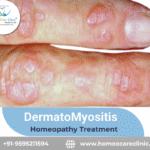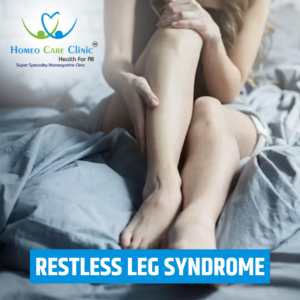Understanding Restless Leg Syndrome (RLS)
Restless Leg Syndrome (RLS) is a neurological condition that affects millions of people worldwide. Despite being common, many individuals live with the discomfort of RLS without knowing the cause or seeking treatment. This blog aims to demystify Restless Leg Syndrome, offering clarity, sharing a case study, and explaining how individuals can manage or even overcome this condition.
What is Restless Leg Syndrome?
Restless Leg Syndrome, also known as Willis-Ekbom Disease, is a condition that causes an uncontrollable urge to move the legs, usually due to unpleasant sensations. These sensations typically occur in the evening or at night when a person is resting or lying down. Moving the legs often provides temporary relief.
What Causes RLS?
The exact cause of Restless Leg Syndrome remains unclear, but several factors and conditions are associated with it:
- Genetic Link: RLS often runs in families, indicating a possible genetic component.
- Iron Deficiency: Low levels of iron in the brain can contribute to RLS.
- Chronic Diseases: Conditions like kidney failure, diabetes, and Parkinson’s disease can trigger RLS.
- Medications: Some medications, such as antihistamines and antidepressants, may worsen symptoms.
- Pregnancy: Hormonal changes during pregnancy, particularly in the last trimester, can cause temporary RLS in some women.
- Lifestyle Factors: Lack of exercise, poor sleep habits, and high caffeine or alcohol intake can exacerbate symptoms.
Symptoms of Restless Leg Syndrome
The primary symptoms of RLS include:
- Unpleasant Sensations: Described as crawling, itching, pulling, or tingling in the legs.
- Urge to Move: A strong desire to move the legs to relieve discomfort.
- Symptoms Worsen at Night: The sensations are usually more intense during the evening or night.
- Relief with Movement: Walking, stretching, or other movements temporarily ease the symptoms.
- Interrupted Sleep: Many people with RLS struggle to fall asleep or stay asleep, leading to daytime fatigue.
How is RLS Diagnosed?
There is no specific test for Restless Leg Syndrome, but diagnosis is made based on:
- A detailed medical history.
- A physical examination.
- Evaluating symptoms against established criteria.
- Blood tests to rule out iron deficiency or other underlying conditions.
Doctors may also ask about family history and lifestyle habits to identify potential triggers.
Case Study: Overcoming Restless Leg Syndrome
Let’s explore the real-life story of Priya (name change), a 42-year-old teacher from Pune.
Background
Priya had been experiencing a strange discomfort in her legs for over three years. She described it as a tingling and crawling sensation, particularly in the evening when she tried to relax after work. The discomfort often kept her awake at night. Priya initially thought it was fatigue or stress, but as the symptoms persisted, she decided to seek help.
Diagnosis
Priya visited her doctor, who conducted a thorough examination and reviewed her medical history. Blood tests revealed mild iron deficiency, and her symptoms matched those of Restless Leg Syndrome.
Treatment Plan
Priya’s treatment included:
- Dietary Changes: Her doctor advised increasing iron-rich foods like spinach, lentils, and nuts.
- Iron Supplements: She was prescribed iron supplements to address the deficiency.
- Lifestyle Adjustments:
- Regular exercise, such as yoga and walking.
- Reducing caffeine and alcohol intake.
- Establishing a consistent bedtime routine.
- Homeopathy: Priya opted for homeopathic remedies, which helped address her specific symptoms without side effects.
Results
Within three months, Priya noticed significant improvement. Her nighttime discomfort reduced, and she was able to sleep better. With continued care, Priya’s symptoms are now well-managed, allowing her to enjoy her evenings and sleep peacefully.
Management and Treatment Options for RLS
There are several ways to manage and treat Restless Leg Syndrome, ranging from lifestyle changes to medications. Here are the most common approaches:
1. Lifestyle Changes
- Exercise Regularly: Moderate activities like walking, cycling, or yoga can reduce symptoms.
- Improve Sleep Hygiene: Maintain a consistent sleep schedule and create a calming bedtime routine.
- Avoid Triggers: Limit caffeine, alcohol, and nicotine, as they can worsen RLS symptoms.
2. Dietary Adjustments
- Include iron-rich foods like leafy greens, beans, and fortified cereals.
- Ensure adequate intake of magnesium and vitamin B12, which support nerve health.
3. Medications
In severe cases, doctors may prescribe medications, such as:
- Dopamine agonists to regulate movement.
- Iron supplements to address deficiencies.
- Anticonvulsants for nerve-related discomfort.
4. Homeopathic Remedies
Homeopathy offers personalized solutions for RLS. Common remedies include:
- Rhus Toxicodendron: For restlessness and stiffness in the legs.
- Zincum Metallicum: Effective for constant leg movements and tingling sensations.
- Causticum: For cramps and weakness in the legs.
- Arsenicum Album: Suitable for individuals with restless and burning sensations in the legs, especially at night.
- Cocculus Indicus: Effective for individuals experiencing sleeplessness and leg discomfort after mental or physical exhaustion.
- Tarentula Hispanica: Helps with uncontrollable leg movements and agitation.
- Sulphur: Useful for individuals with itchy or burning sensations in the legs, especially when symptoms worsen at night.
- Relaxation Techniques
- Practicing mindfulness or meditation can reduce stress and improve sleep quality.
- Warm baths or leg massages before bedtime can ease discomfort.
FAQs about Restless Leg Syndrome
1. Is RLS a lifelong condition?
Not necessarily. While some people experience chronic symptoms, others may find relief through proper treatment and lifestyle changes.
2. Can children have RLS?
Yes, children can develop RLS, although it is less common. It’s often misdiagnosed as growing pains or ADHD.
3. Does RLS only affect the legs?
Although most common in the legs, RLS can also affect other body parts, such as the arms, in rare cases.
4. Is RLS linked to other health conditions?
Yes, it is often associated with iron deficiency, kidney disease, diabetes, and Parkinson’s disease.
5. Can homeopathy cure RLS completely?
Homeopathy can significantly alleviate symptoms and improve quality of life. However, a complete cure depends on individual factors and the underlying cause.
Living with Restless Leg Syndrome
Managing Restless Leg Syndrome requires patience and consistency. Simple changes, such as improving your diet, staying active, and addressing deficiencies, can make a big difference. If you’re struggling with RLS, don’t hesitate to seek professional help—relief is possible.
By raising awareness and sharing real-life stories, we hope to empower more individuals to take control of their health and find the support they need to overcome RLS. If Priya can do it, so can you!
Homeo Care Clinic offers a holistic approach to treating the disease. The remedies mentioned above can treat the underlying causes of the condition and offer relief from the discomfort. However, it is important to consult a qualified homeopathic practitioner for the correct dosage and duration of treatment. Homeo Care Clinic provides comprehensive care for various ailments, and offers customized treatment plans based on individual requirements.
To schedule an appointment or learn more about our treatment, please visit our website or give us a call +91 9595211594 our best homeopathy doctor will be here to help.
Follow us on Facebook, Twitter, and Instagram for valuable insights into the world of homeopathy and holistic health.
Facebook – https://www.facebook.com/homeocareclinicpune
Instagram – https://www.instagram.com/homeocareclinic_in
Website – https://www.homeocareclinic.in
Success Stories of Patients – homeocareclinic.in/category/case-study
YouTube Patient Review – https://www.youtube.com/playlist?list=PL__SnPQCl4WLPFV7iJOdQxn4YaB6IkPHJ
LinkedIn – linkedin.com/company/homeo-care-clinic
Chat with a best homeopathic doctor privately
If you have any queries regarding your disease or any symptoms, click to send a WhatsApp message. Our best homeopathy doctor will be happy to answer you.
Book an Appointment
If you want to visit our clinic, click to book an appointment.
Online treatment
If you are a busy professional, or you are living in a remote town or city, with no best homeopathic doctor near you, Click to start an online homeopathic treatment with the world’s exclusive, most experienced and best homeopathic clinic, managed by Dr. Vaseem Choudhary world-renowned homeopathic doctor expert






